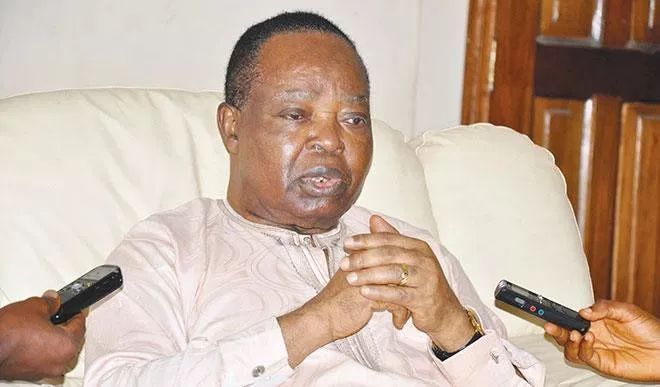He was in long retirement from politics, playing only minor roles from the end of the Second Republic in 1983 until his death on Thursday, December 2, at the age of 79. Before that, he was a towering figure on the national scene.
Joseph Wayas was a little known former Commissioner of Transport in the South Eastern State during the Gowon era but in the tumultuous politics leading up to the Second Republic in 1979, he became increasingly important as a leader in the National Party of Nigeria, NPN.
In the first of five rounds of elections held on July 7, 1979, Wayas was elected Senator for Ogoja District, old Cross River State on NPN’s ticket. NPN captured 36 of the 95 Senate seats nationwide, including three of the five seats in Cross River State. GNPP captured the other two. Three weeks later, NPN’s candidate, former Central Bank of Nigeria Governor Dr. Clement Isong, won the governorship of Cross River State, one of the 7 out of 19 governorships that NPN won across the country.
Aware of its slim lead in both Senate and House of Representatives where it had slightly above one thirds of the seats each, NPN leaders moved during the transition period and concluded an accord with Dr. Nnamdi Azikiwe’s Nigeria Peoples Party, NPP, which had won three governorships and 15 Senate seats. The two parties then shared National Assembly leadership posts among themselves. NPN took the Senate President and Deputy House Speaker while NPP got House Speaker and Deputy Senate President.
NPN had a pre-agreed zoning formula. It zoned the Presidency to the North, where six aspirants from all over the region contested. It zoned the Vice Presidency to the East [Igbos specifically], Party National Chairman to the West and Senate Presidency to the southern minorities. Thus, Wayas was elected Senate President, with John Wash Pam [NPP, Plateau] as his deputy. NPP’s Edwin Ume-Ezeoke [from Nnewi, Anambra State] was elected House Speaker with Idris Ibrahim Kuta [NPN, Niger State] as his deputy.
NPN was a very cohesive political party and Joseph Wayas’ headship of the Senate was very stable. Although he faced strident opposition from the UPN caucus led by Chief Jonathan Odebiyi of Ogun, there was no serious threat to his position. More so because GNPP soon split into Waziri Ibrahim, Nduka Eze and Mahmud Waziri factions, the latter two being sympathetic to the NPN. Most of GNPP’s 8 senators belonged to the rebel, pro-NPN factions, which further solidified Wayas’ position. PRP too soon split into Tabo and Santsi factions, and the Aminu Kano-led Tabo senators, including the fiery Alhaji Sabo Bakin Zuwo, loosely allied with NPN in the Senate.
Wayas’ control of the Senate was strongly buttressed by the Senate Leader, the powerful Dr. Olusola Saraki. Although Senate rules initially called for appointing a “Majority Leader,” it passed a resolution recognizing Saraki as “Senate Leader” instead, while the other four parties—UPN, NPP, GNPP and PRP—each had a leader in the Senate. Only the UPN senators provided consistent opposition to Wayas and Shagari. On one occasion when Wayas overruled a UPN motion, Odebiyi tabled a “motion of censure” against him, but it was withdrawn shortly afterwards.
Within the National Assembly, there was some contest between Wayas and House Speaker Ume-Ezeoke. Whenever Shagari was going to address a National Assembly joint session, senators moved to the House Chamber, which was larger. The Speaker usually yielded his seat to the Senate President to president over the joint session but one day in 1981, there was some dispute and House members urged the Speaker not to yield his seat. When senators came into the chamber, Ume-Ezeoke stayed put, loudly cheered by House members. Wayas then took a lower seat but presided over the joint session anyway, since it was his constitutional prerogative.
There was never an open disagreement between the Wayas-led Senate and President Shehu Shagari’s government. That was partly because NPN had a caucus of its top chieftains that met at the State House every Monday evening. Shagari, Vice President Alex Ekwueme, Wayas, Saraki, Kuta, House Leader Yunusa Kaltungo, party chairman Adisa Akinloye, party secretary general Sulaiman Takuma and Secretary to the Federal Government [SFG, the post now called SGF] Shehu Musa, Makaman Nupe attended the meeting and harmonized every position. Which was why the Shagari-era NPN party secretariat, Federal Executive Council and National Assembly were in near-complete sync.
While Joseph Wayas had a very peaceful life in the Senate and was a powerful figure at the National level, mid-way into the Second Republic he became embroiled in a very bitter fight in his home state with Governor Clement Isong. Wayas led what was tagged “Lagos Group” while Isong led the “Home Front.”
With the apparent support of NPN national leaders, Wayas’ candidate, Senator Donald Etiebet, defeated Isong in NPN’s governorship primaries of 1983, or so it was claimed. The power tussle probably had some ethnic colouration because when NPN denied Isong renomination, he tearfully addressed a press conference in Calabar and said something like, “You cannot run Cross River State without the Ibibio.”
Isong then defected to UPN and ran for reelection as its candidate. He did relatively well in the 1983 election, garnering about 39% of the vote but lost to NPN’s candidate Etiebet. The 39% performance compared remarkably with the paltry 2% of the vote that UPN got in the state in 1979.
Soon after the 1983 elections ended, Wayas paid a ‘thank you visit” to NTA headquarters in Lagos, with Governor-elect Etiebet tagging behind him. It was an open display of who was boss in Cross River State. NTA’s Director General Walter Ofonagoro received him. Three months later, the Second Republic was overthrown. Wayas went into exile, returned to the country three years later and was briefly detained. He mostly refrained from playing serious roles in politics thereafter.
May his soul rest in perfect peace.









